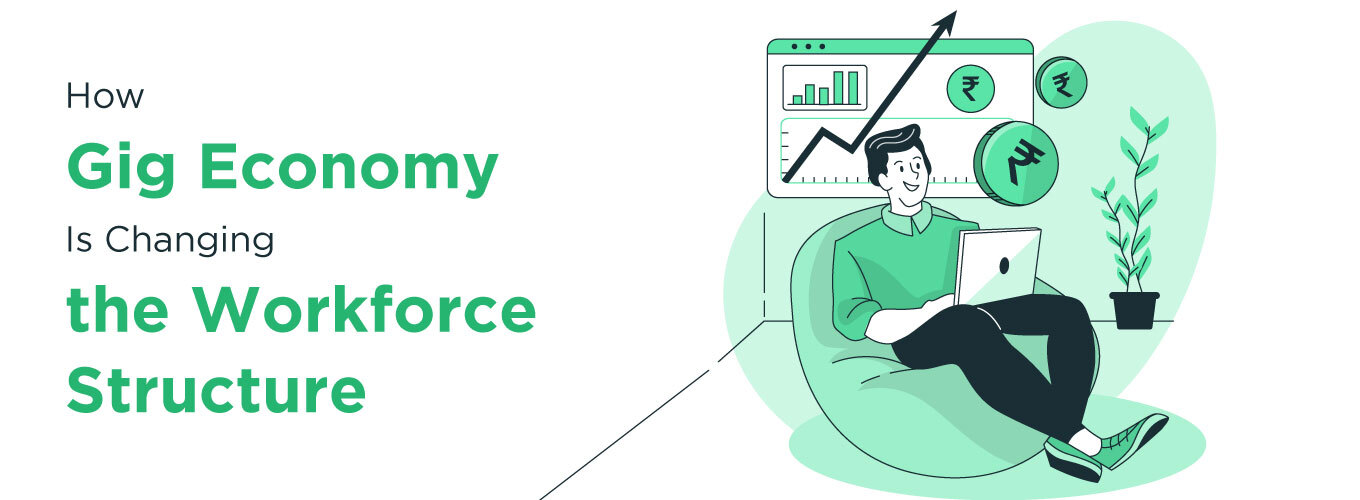How Gig Economy Is Changing the Workforce Structure
Before we go on to analyze how the gig economy is changing today’s workforce structure, let us first understand what gig economy stands for.
Table of Contents
What is the gig economy?
By definition gig economy refers to a framework that focuses on hiring freelancers and independent workers on a contract basis to complete a job. This is a shift from the traditional way of working where permanent, highly skilled, employees work for a large organization. The new gig economy is giving a new, exciting meaning to the term employment and even changing its concept and practice.
Today’s changing workforce
Recently, there has been an explosion of digital platforms in the service space resulting in the demand for casual workers. The gig is the most cost-efficient and effective solution for such requirements. Organizations are developing a need for a flexible workforce. Combined with this, post-pandemic, the hybrid and remote-working culture has caught on and therefore there is a boom in the requirement of gig workers. New age workplaces use technological innovations that lead to unusual opportunities for both themselves and individuals where they are not bound by geographies anymore. The nature of work is changing and the gig economy is becoming a constant feature in new-age workplaces.
Three parameters defining the boom in the gig economy:
- Flexibility: Hybrid and remote working have made the job of the gig worker more flexible.
- Technology: Technology has drawn job seekers from tier-2 and tier-3 cities into the talent pool.
- Seasonality: It denotes the scaling up of an organization’s workforce temporarily during a period of boom or during a high-volume business cycle.
Organizations have come to terms with the fact that they require a flexible and scalable workforce that can be changed according to the needs of customer demand and variability in business.
In terms of the workforce structure, the gig economy trends will shape the nature of the recruitment industry in the coming years. The hiring industry is moving from the responsibility of bringing in full-time employees which is an expensive and time-intensive affair to bringing on skilled workers on a contract basis.
Gig economy trends
Some gig economy trends that will shape the recruitment industry in the coming years are listed below:
- Preference for freelancers
In the last decade, there has been a shift from full-time employment to contract work. More individuals are taking up gig work rather than a traditional job. In large companies, a majority of tasks are completed by engaging external workforce and leveraging freelancers. The structure of the gig economy allows for additional opportunities for freelancers since most of the work is done online and this enables people to work from home. Remote working is the raging trend today. Additionally, taking on more freelancers reduces the cost of operation for companies and also costs related to recruitment.
- Technology as an enabler
Technology has changed the way recruitment is happening today. With the explosion and penetration of the usage of the mobile phone, sourcing candidates is suddenly open and boundaryless. Many companies use social media to source potential employees. These platforms provide a virtual platform for companies to reach freelancers globally where geography is not a barrier. Very soon it is estimated that an AI recruiting software will assist in the selection of the best talent from a pool of talented and skilled individuals.
- Freelancing is no longer a stigma
The shame and strain of being a freelancer is slowly dissolving. This is also because of the profile of freelance workers. Earlier, only drivers, delivery agents and cashiers were a big part of the gig economy. Now the profile has grown to include managers and supervisors. Start-ups are looking at executives too from the gig economy. Gig workers assume significant responsibilities in organizations and run things efficiently. All this has set a strong foundation and brought in a lot of opportunities for gig workers.
Redefining the attitude towards gig workers
Gig workers have always been a part of the workforce but they have never been recognized or given much importance. Employers and leaders must begin to change their attitude and outlook towards gig workers and identify them as part of the mainstream. The policies, systems and practices in a company are all always oriented towards the permanent workforce. To make the workplace more conducive towards the development of gig workers, these will have to be revamped. Thus, the aspirations of the gig workers can be managed.
The future of the gig economy
The gig economy provides a win-win situation for both the employers and job seekers by providing a flexible workforce at a nominal cost to the employers and a sustainable career path to the job seeker. With the growth of digital platforms, the gig economy is expected to boom in the coming years. A concrete career path is fast becoming an obsolete concept for the youth with Gen Z valuing the experience that comes with the job more than the monetary benefits and rewards. People are moving from an “always working” mode to an “on demand” working mode and this will significantly alter the workforce structure going forward.









